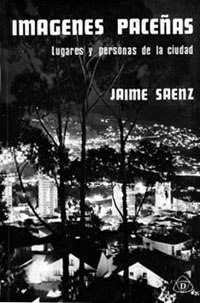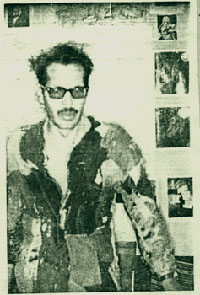|
Your Skull
-- for Silvia Natalia Rivera
These rains,
I don't know why they would make me love a dream I had, many years back,
containing a dream of yours
-- your skull appeared to me
And it had an exalted presence;
it didn't look at me -- it looked at you.
And it drew near my skull, and I looked at you.
And when you were looking at me, my skull appeared to you;
it didn't look at you.
It looked at me.
In the exalted night,
someone looked on;
and I dreamed your dream
-- beneath a soundless rain,
you hid within your skull,
and I hid within you.
The Basket of Wool
Desiring yet unable, I dreamt myself in this room sleeping and I dreamt
myself being able,
making a basket of wool toll like a bell to keep myself sleeping,
and wanting them to come not come, and to make not make a basket of wool toll like a bell prompting a sadness without desire,
eliciting a Japanese music that makes me weep remembering but not hearing,
summoning an unsummonable scene that pure luck renders summonable,
as when one says:
now that this lady summons speaking and that gentleman speaks summoning,
as when one says:
"Come here, little parrot; let's make this basket of yarn toll like a bell," leaving everyone happy with this Japanese music that makes me weep, in summoning,
and which goes on eliciting and tolling and goes on playing through the night.

The City
-- for Blanca Wiethuchter
and Ramiro Molina
With the smoke and with the fire, many people muffled and silent
on a street, on a corner,
in the high city, pondering the future in search of the past
-- in the subtle entrails, night lightning
in the probing eye, thoughts go to agony
In another age, hope and happiness were good for something-time's flow invisible,
and the darkness, an invisible thing,
was revealed but to the infinite elders fumbling forward to feel if you might not be among them,
while fumbling to touch some children they think they feel, even though these little ones feel them and are confused with them, feeling you,
as in solitude you feel a shawl of darkness woven with unfathomed sadness by some habitant,
dead and lost in this transparent darkness that is the city I myself inhabit,
inhabiting a city at the base of my soul which is inhabited but by a single habitant,
-- and like a city filled with sparks, filled with stars, filled with fires on the street corners,
filled with coals and embers in the wind,
like a city where many beings, alone and distant from me, move and murmur with a destiny heaven no longer knows,
with eyes, with idols, and with children smashed by that very heaven,
with no more life than this life, with no more time than this time,
hemmed-in by the great wall of fire and oblivion, rocking in the swing of despair,
soundlessly weeping with this sinking city.
And no angel or demon in this well of silence.
Only fires lining the long streets.
Only the cold contours of shadows, the indifference of the sun pulling back.
The breath of a dawn for the last time breaking, the doors creaking in wind,
the boundaries breaking up and scattering and the forms fusing with the flames,
the signs and the songs,
with a remote anguish, in the soil and beyond the soil,
and the breathing of the dead, the incessant rains,
resignation with its taste of bread, in a house that stalks me between dreams,
the patios and the steps, the beings and the stones, and the hallways without end,
the windows opening to emptiness and shutting to shock,
the rooms where I lose myself and the corners where I hide
-- the dark walls and the wet moss, the outposts where I look for I don't know what,
hiding myself from the swelling odor of habit.
No voice, no light, no testimony of my former life.
Only the fires,
undying though forever flickering, and only the fires.
The desolate portent of the ghost once named youth
-- in my city, in my dwelling.

Jaime Saenz
dressed in a beggar's jacket
|
|
